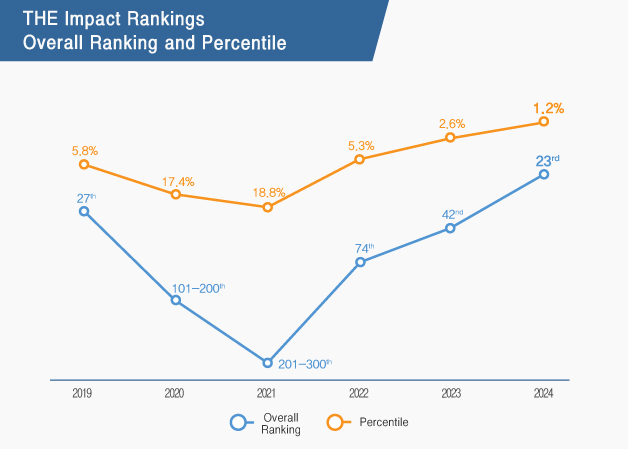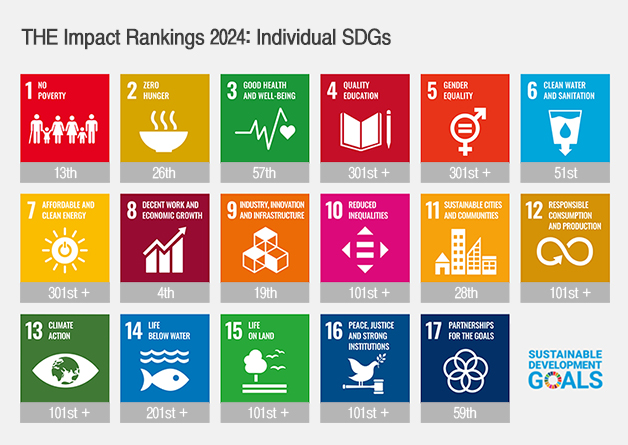header
Education News
Kyung Hee Ranks 23rd Overall in the World and 2nd Among Global Private Universities in THE Impact Rankings 2024
- WRITER 학무부총장실
- VIEW 105

The University has achieved an impressive 23rd place in the world and 2nd among all global private universities in the 2024 University Impact Rankings presented by Times Higher Education (THE)
The THE Impact Rankings, announced by the British publication Times Higher Education, evaluate universities’ contributions to the United Nations’ Sustainable Development Goals (SDGs). These rankings serve as a vital indicator of a university’s efforts towards creating a sustainable future for humanity and civilization. This year, Kyung Hee excelled globally in several key areas: 4th for SDG 8 (Decent Work and Economic Growth), 13th for SDG 1 (No Poverty), 19th for SDG 9 (Industry, Innovation, and Infrastructure), 26th for SDG 2 (Zero Hunger), and 28th for SDG 11 (Sustainable Cities and Communities). The University’s outstanding performance, ranking within the top 50 worldwide for these five goals, highlights the significant contributions Kyung Hee has been making towards these important objectives.
Enhancing partnerships on a global and public level to advance research, education, and practical initiatives aimed at creating a sustainable future
Global and public partnerships are crucial for achieving the SDGs, which is why the UN has included partnerships as SDG 17. THE uses SDG 17 as a core criterion in its overall ranking calculations, along with the university’s three highest-scoring SDGs.
Kyung Hee University, a pioneer in universities’ social responsibility and international contributions, has established itself as a “true university of the future.” The University prioritizes global and public partnerships to address social and global issues, working closely with educational and academic institutions, international organizations, non-governmental organizations, and government agencies worldwide. Since the launch of the Miwon Peace Institute and the Global Academy for Future Civilizations framework in May 2022, Kyung Hee has further strengthened these partnerships, focusing on research, education, and practical initiatives that contribute to a sustainable future of human civilization. The annual Peace BAR Festival, held in celebration of the UN International Day of Peace, along with international academic conferences and lecture series such as the Miwon Lecture and the University Lecture, are part of these efforts. These events are open to the public, sharing the insights of scholars, experts, and practitioners, fostering a reflective and practice-oriented mindset.
Kyung Hee is also expanding SDG education and enhancing specialized curricula to cultivate global citizens and SDG/ESG experts. Since 2019, the University has proactively implemented essential SDG-based courses for all students and has expanded them into major programs. The Graduate School has introduced a new Intelligent Energy Convergence major to train interdisciplinary professionals in achieving carbon neutrality. The Graduate School of Technology Management has established an Advanced ESG Management Program to develop senior professionals capable of addressing environmental and social crises brought about by climate change and leading efforts towards carbon neutrality.

Kyung Hee Ranked 19th globally in SDG 9 by dedicated efforts to bringing its technologies to market
The University supports the development of SDG-related government policies by conducting research funded by national research institutions, forming partnerships with government agencies, and engaging in diverse social activities. In 2023, Kyung Hee consolidated its capabilities to address societal and global issues by launching the ESG Committee. The committee developed a public ESG evaluation model as its first initiative and continues to pursue related research. It aims to become a key hub of support and guidance for both universities and public institutions in their efforts to broach the sustainable development of human society.
Kyung Hee’s efforts have been recognized, ranking 59th globally for SDG 17 (Partnerships for the Goals). Our commitment to building a robust industry-academia collaboration ecosystem on campus was highly appreciated, leading to its 4th place in SDG 8 (Decent Work and Economic Growth) and 19th spot in SDG 9 (Industry, Innovation and Infrastructure). Kyung Hee has strengthened education and research in industry-academia collaboration and extended its research, technology, and educational achievements to contribute to society. This dedicated collaboration earned the University the second-highest technology transfer income among private universities in Korea (based on the 2023 university information disclosure).
Research teams from the College of Medicine and the College of Science are working to commercialize Kyung Hee’s proprietary carbon nanotube technology. They are undertaking national projects in partnership with the Korea Atomic Energy Research Institute (KAERI), the Korea Advanced Institute of Science and Technology (KAIST), several university hospitals, and companies related to radiological equipment to develop next-generation X-ray technology. Over 90 startup teams are realizing their dreams at the Hongneung Biotech-Medical Start-up Center and the Sam-eui-won Start-up Center. A variety of incubating programs support all members of Kyung Hee community to succeed in startups, thereby channeling their educational and research capabilities back to society.
Kyung Hee has consistently received high praise for its contributions to SDG 9 (Industry, Innovation, and Infrastructure) in the THE Impact Rankings, earning the highest scores for this goal for four consecutive years since 2021. According to the UN, each category of SDG is broadly related to all other SDGs while intricately connected with a number of specific goals. SDG 9, for instance, is organically linked to five other SDGs. Achieving sustainable industrialization through technological innovation and infrastructure building can have a significant impact on economic growth (SDG 8) and address issues related to water (SDG 6), energy (SDG 7), and climate change (SDG 13).
One notable example is the research by Kowhang Emeritus Professor Jong-whan Rhim of the Department of Food and Nutrition, who developed biodegradable and functional nanocomposite packaging materials. These materials use biopolymers derived from plant- and animal-based proteins and carbohydrates that can naturally decompose. These packaging materials are also safe enough to be edible. The development of biodegradable plastics is seen as a solution to the microplastic problem. Professor Rhim has been recognized for his research excellence, being named on the World’s 1% Highly Cited Researchers (HCR) list by Clarivate for eight consecutive years.
The growing awareness of severe climate, environmental, and ecological crises, pandemics, the threat of nuclear war, and the dangers of artificial intelligence has heightened the demand for universities to fulfill their social and global responsibilities. Consequently, more universities are participating in the THE Impact Rankings. Other university evaluations are also introducing new indicators related to universities’ social and global responsibilities. Last year, the leading global higher education company Quacquarelli Symonds (QS) announced the introduction of three new performance indicators in its World University Rankings to reflect the changing role of universities, one of which is sustainability.
Kyung Hee has participated in evaluations for all SDG categories since the THE Impact Rankings was first introduced in 2019. All 17 SDG goals, which aim for sustainable development for humanity, align with the values Kyung Hee has inherited and developed. The University has pursued the founding values and traditions of “Creating a Civilized World” and “Academe and Peace,” solidifying its identity as an academic institution while contributing as a public institution to a sustainable future for humanity. Our consistent efforts have been demonstrated by being ranked globally in all goals for six consecutive years, from 2019 to this year.